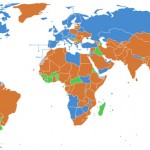Kuwait’s workforce demographics trends – does national culture matter?

Welcome to Kuwait, the country where roughly nine out of ten people work in the public sector and where the unemployed are still not willing to join the private sector anytime soon. So what are the reasons behind this scenario? Well, as we are about to find out, there are plenty and of all kinds.
Aside from the socioeconomic circumstances that led to this acute public-private imbalance – 87% of Kuwait’s manpower works in the public sector, there are also cultural factors affecting workforce behavior.
As such, this article will look over all these potential causes, but will press on the cultural traits which not only attest the Kuwaiti people’s partiality for a job in the public sector, but also influence human performance.
But in order to get a handle on this, let’s first take a look over at Kuwait’s profile and numbers, the recent changes in national workforce demographics, as well as its economic growth prospects.

Kuwait in numbers
Kuwait’s oil reserves account for more than 6% of global supply and its dependence on oil is quite obvious, since over half of the GDP and 89% of government income are a result of petroleum sales. Under these conditions, the country’s growth forecast is most highly associated with oil prices, which are by no means good enough at the moment, standing at a modest US$ 44/barrel.
An oil price of at least US$ 50/barrel is required, so that Kuwait can re-balance its economy, a curbstone hard to hit if OPEC and non-OPEC members will not reach an agreement with regards to the current oversupply. This is an improbable culmination, given the last meeting in Doha. On April 17th, Iran and Saudi Arabia stood their ground, stating that there is no room for an oil production freeze.
And as the world oil producers met in Qatar, Kuwaiti oil workers started a strike over pay reforms. The strike made OPEC’s fourth largest oil producer reduce its output to 1.1 million barrels/day, down more than half from Kuwait’s daily average of 3 million barrels/day.
Even so, non-Kuwaiti oil workers were not on strike, already feeling uneasy with the rumors about a dire drop in foreign employee numbers, with expats accounting for over 70% of the total 4.2 million people living in the West Asian country.

Culture and the labour force
The number of employees in Kuwait totals up to 42% from the total population, namely 1.8 million, out of which only approx. 340,000 are Kuwaiti nationals. The actual unemployment rate in Kuwait is 3.5%, which means that almost 12,000 people are currently looking for a job.
What is surprising, however, is that 58% of the unemployed Kuwaitis would rather stay at home, instead of joining the private sector, as a survey conducted by Kuwait’s Central Statistical Bureau reveals.
This is inexplicable, at least at first sight, given the fact that public sector employees will be the first ones to suffer from the new payroll schemes that are going to be introduced this year, coming as a response to the sharp drop in crude oil prices that occurred last January.
However, as severe as this situation may seem, national culture might bring an answer to this conundrum; Geert Hofstede, a Dutch professor and social psychologist, well-known for his cultural dimensions research, highlighted the importance of a society’s culture on the values its members.
So let’s see if cultural factors might explain this tendency for public sector jobs; thus, let’s take a look over Hofstede’s cultural framework and the scores Kuwaitis got for the dimensions this is comprised of.
Although the model consists of six dimensions, namely Power Distance, Individualism, Masculinity, Uncertainty Avoidance, Long Term Orientation and Indulgence, the data available for the latter two was not conclusive enough, whereas the scores for the rest of those revealed important aspects.
Bear in mind that even if culture can be only used meaningful by comparison, it can still offer important indicators concerning human behavior.

Kuwait scores high on the Power Distance dimension, achieving a score of 90, which shows that people have deep respect for hierarchical order and that they have no problem with the unequal distribution of power.
Working in the public sector comes with influence, by no way achievable if being an entrepreneur or working for one – or, at least, this is what a majority of Kuwaitis think. Public sector jobs also accommodate higher salaries, oftentimes less exhausting work, shorter working hours, and more public holidays. In short, power.
Individualism refers to the extent of interdependence a population or society cultivates among its members. Judging by the score Kuwait got for this dimension – 25, Kuwait is considered to be a collectivist society, characterized by devotion and commitment to the group. And when little short of all your friends work in the public sector, one cannot but empathize with their thought-process.
With a score of 40 for the Masculinity dimension, Kuwait is considered a relatively feminine society. This reveals a predisposition to submissiveness, whereas standing out of the crowd is considered to be out of the common road, which is usually trailed by a group. Thus, starting your own business or working for a private sector entrepreneur is not seen as a common road approach.
Uncertainty avoidance relates to a society’s perception regarding future. In many cases, this refers to job security. A score of 80 for this dimension reveals a predilection for staying away from uncertainty. Which, indeed, can be easily accomplished by working in the public sector, in any country, not just Kuwait. As it can be observed in the above chart, there is currently no score for the last two dimensions.
So what have we learnt from all of this?
Well, for starters, culture does matter. Not only the national one, but also the organizational one. Furthermore, culture is what makes us different in the first place.
Now, while it is true that it cannot influence or have a massive impact on oil prices, terrorism eradication efforts, environmental sustainability issues, neither decide the UEFA Champions League winners, it will always represent that small part that should never be neglected and cannot be neglected.
Culture is everywhere around us, in an ever-changing state and it is up to us as individuals to decide what’s a productive culture and what is not.
Image sources:

Tags: Government performance, Performance in Kuwait, Public sector





